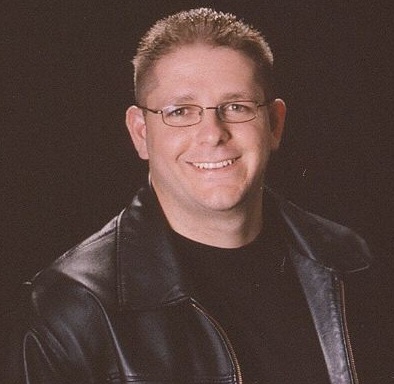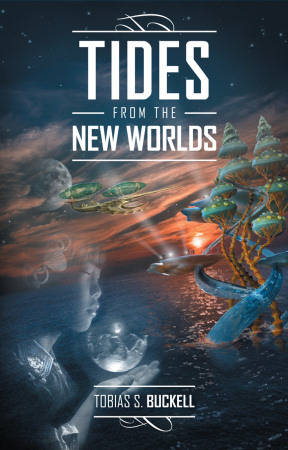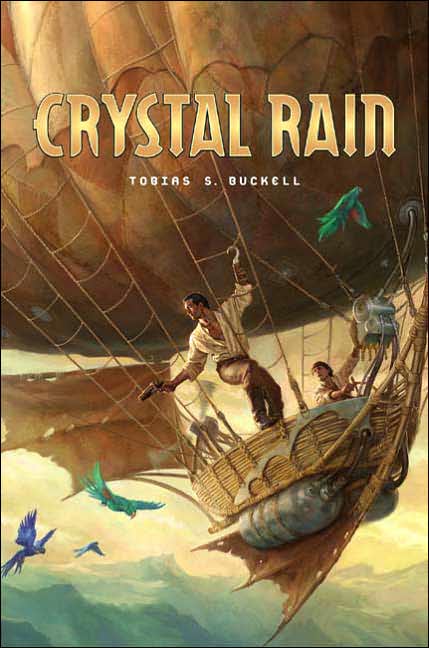Tobias Buckell is the author of numerous short stories and novelettes (many appearing in his collection Tides from the New Worlds); the “caribbean steampunk” novel Crystal Rain and its successors Ragamuffin and Sly Mongoose; and the New York Times bestselling Halo novel The Cole Protocol. He is also a well-known blogger, a past Writers of the Future winner, and a fellow member of the Codex writers’ group. Knowing both about his many successes and about the surprising number of difficulties he’s overcome, I asked to interview him about his writing and his motivation through hard times. This is part one of that three-part interview.

You’ve made mention in interviews of your Mom giving you a little box of words to play with and talking to you about reading when you were young. Has her influence, or the influence of other family members or teachers, especially influenced your desire to write?
Well, mom was instrumental in getting me to become such an avid reader. She taught me how to read at a rather young age, and since we didn’t have TV on the boat I grew up on, I turned to reading a lot. She also helped me out by not really putting much of a stop to what I read. She let me read whole books almost right out the gate.
The box of words obviously helped. I would sit and play with the words. Laying them out into sentences, like fridge poetry. All of that steeped me in words and books and what not from as early as I can remember.
But as for writing, I think mom always figured I’d be a librarian due to my love of reading all the time, rather than an actual writer!
Then it sounds as though the desire to write is a more personal thing. What attracts you to it? What’s so appealing about writing that you can go back to the keyboard day after day and get new words down?
I like living in imaginary worlds, or daydreaming. I daydream a lot. It might come out of my being ADHD, I don’ t know. Most people grow out of what they call ‘childish’ daydreaming. But I never stopped, I never let it get grown out of me. When I was a kid I loved to escape and read about other places and other worlds, and daydream about them. I just never stopped, and over time started mentally escaping to worlds I’d built.
I was the kid who played with Legos all through my life. It was cool as a kid, then as you hit older grades it stopped being cool and I kept playing with them anyway. And then somewhere in college it got cool again, according to others. I just never cared all that much. I liked making stuff up.
Your mentioning ADHD brings up an interesting point: you have attention-related problems, yet you have written successful novels–not just once, but repeatedly. On first blush the two wouldn’t seem compatible. Is it that you become immersed in your story, and under those conditions the attention problems go away? Or do
you work around them? Or something else?
ADHD comes with an either/or switch. You’re highly distractible in one mode, and then go into long bouts of hyperfocus in another. The hyperfocus is often what throws people from diagnosis, as ADHD people tend to get an intense bit of work done in that stage. However, it’s hard to manage, and once broken, you’re out of it.
For example, I just spent eleven hours working on a project yesterday, all of it straight through, because once I got everything loaded up into my head I was completely absorbed by it. That’s not unusual. [Related Willpower Engine article: Flow: What It Feels Like to Be Perfectly Motivated]
My writing habits tend to reflect my need for quiet and focused time. I write from midnight to four am. No one calls, emails, or interrupts me during that time. If I get into a focused mode, there are no interruptions, and if I can just latch onto something, I usually will go all night. It’s rather intense. [Related Willpower Engine article: Handling Distractions by Managing Responsibilities, Devising Rules, and Erecting Barriers]
ADHD also helps my creative side. Research is fun. Wikipedia is ADHD crack. I can click around, jump from subject to subject, and just absorb interesting stuff. It all bubbles up later. I’ll see a show about ships made of ice, and then something else equally weird, and it’s all just undirected exploration that feeds the loam of the imagination.
You mentioned in an interview a few years ago that you started your blog “as a way to initially force myself to write and submit short fiction by being in the public eye.” Has being so visible had a consistent effect on your drive to get more writing done, or to complete projects you’ve talked about?
Yeah, it was a sort of ‘perform in public’ sort of thing. I wanted to share my journey on the path to being published. Knowing that people were out there rooting for me already, before I was even published, helped me keep at it. [Related Willpower Engine article: Kaizan on Whether It Helps to Announce Goals Publicly]
So is having people out there rooting for you helping you by encouragement? Accountability? Both? something else?
A little bit of both. The third leg to that stool is the fact that we know that people who write down their goals are more likely to accomplish a chunk, if not all, of those goals. Particularly if they are goals within your control (ie: you can’t say, I’m going to have four short stories published in major magazines this year. But you could say, I will write four short stories and submit them repeatedly to all the major magazines, sending them right back out if they’re rejected, this year). [Related Willpower Engine article: One Good Way to Judge Goals: S.M.A.R.T.] With the blog and living live, a bit, you get all three pieces: encouragement, accountability, and defined goals. It helped me a lot in the beginning.
Like this:
Like Loading...
 One of the problems with trying to gauge the potential of ePublishing as an author is the limited amount of data out there. The big successes take up most of the spotlight, while the huge proportion of people who digitally publish slink away after a few family and friends have bought copies.
One of the problems with trying to gauge the potential of ePublishing as an author is the limited amount of data out there. The big successes take up most of the spotlight, while the huge proportion of people who digitally publish slink away after a few family and friends have bought copies.




